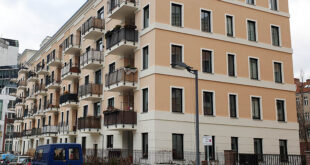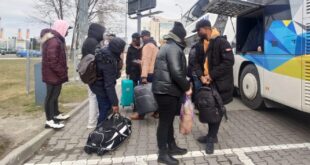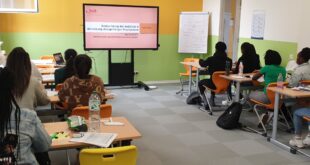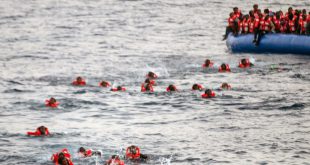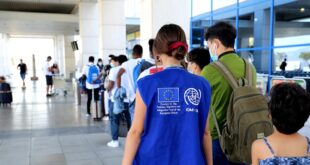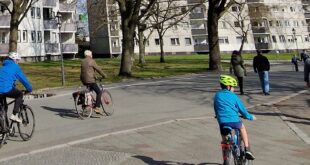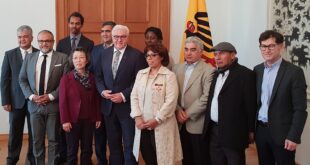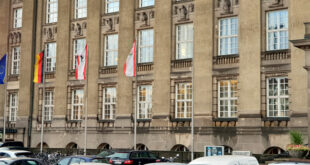The commission set up by the federal government to look into the causes of flight and irregular migration has presented its report, recommending 15 key measures for the effective mitigation of these causes.
—–
An Expert Commission on the Causes of Flight appointed by the Federal Government in July 2019 has called for a more comprehensive political approach to combating the causes of flight.
The commission’s chairperson, Gerda Hasselfeldt, identified war, persecution, hardship and lack of prospects as the main causes of flight while presenting the report in Berlin on Tuesday (18). In addition, Hasselfeldt, who is also the president of the German Red Cross, also named climate change, bad governance and demographic pressure as other factors that drive people to leave their home countries.
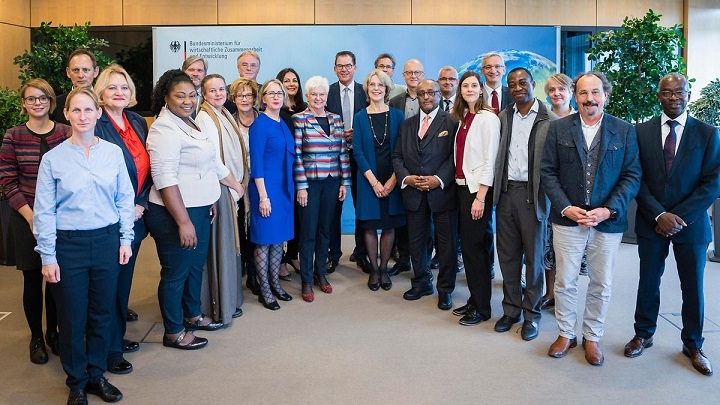
The 24-member commission in a group photograph with Federal Development Minister Gerd Müller (centre, back row)/Photo: TANG
The second chair of the panel and former president of Welthungerhilfe, Bärbel Dieckmann, said that physical, economic and social security were the basis for people to have prospects for themselves and their families and to stay in their home countries. What is needed, therefore, was a comprehensive, inter-ministerial strategy to prevent flight.
“Migrant organisations are important partners in politics: they show increased potential in terms of their expert knowledge and their possible mediation role in migration issues between Germany and their countries of origin. Therefore, we recommend the recognition of diaspora organisations as important actors and partners in German development and migration policy and as actors in the fight against the causes of flight,” Dr Sylvie Nantcha, Chairperson of The African Network of Germany (TANG ) and a member of the commission, said.
Report with catalogue of measures
In its report, the 24-member commission proposes measures to alleviate the causes of flight and displacement and to improve the situation of refugees and internally displaced persons. These include an expansion of civil conflict management and prevention, support for better health, education and social systems, combating climate change, and a restrictive arms export policy.
The 15 policy options, proposed by the commission, represent a comprehensive package of measures that coherently address the most important factors driving flight and irregular migration. The key recommendations include:
- increased efforts to improve the physical, economic, social and political security of people in their countries of origin. This includes, among other things, the development of social security systems, the strengthening of institutions and good governance as well as the targeted promotion of climate protection through so-called “climate matching”;
- a higher priority for internally displaced persons and reliable support for refugee hosting countries;
- an alliance for resettlement with other states for the admission of women, children and victims of sexualised violence from humanitarian crisis areas; and
- strengthening political strategy capacity for crisis prevention and conflict management.
The Commission demands that countries hosting particularly large numbers of refugees be supported.
Müller: Cross-cutting task for the future
Federal Development Minister Gerd Müller praised the report. Implementation is a “cross-cutting task for the future”, he said. The current legislative period and thus the term of office of the current government would soon come to an end. The commission was therefore explicitly addressing its recommendations in the report to the next government, the minister said.
Looking back on the current legislative period, Müller said that Germany was fulfilling its international obligations to protect refugees. He criticised, however, that the EU had not succeeded in developing a coherent arrangement that included a solidary distribution of refugees and a solution for those rescued from the sea. The Mediterranean was still a “sea of death”, Müller noted. It was not enough for the EU to only expand border protection, he added.
Alliance for Resettlement
For the industrialised countries in the EU, the USA, Canada and Japan, the commission’s report recommends an “Alliance for Resettlement”, which supports the UN Refugee Agency’s (UNHCR) programme of the same name for the resettlement of particularly vulnerable refugees. According to the recommendations, these states should take in a number of refugees per year that corresponds to 0.05 percent of their population. For Germany, that would be about 40,000 admissions per year.
READ ALSO German government appoints Sylvie Nantcha member of federal commission on migration
The EU as a whole had pledged 30,000 resettlement admissions for last year, of which Germany had pledged 5,500. This year, Germany wants to take in 6,800 resettlement refugees, said Helmut Teichmann, State Secretary in the Federal Ministry of the Interior. Whether it would be possible to take in 40,000 people within this programme would have to be decided by the next federal government.
The members of the expert commission were drawn from academia, non-governmental organisations, business and international organisations, and their expertise covered the broad spectrum of causes relevant to flight and migration – from conflicts, human rights violations and political persecution to resource scarcity, structural food insecurity, inequality and the consequences of climate change.
Sola Jolaoso
You can download the report at https://www.bmz.de/de/entwicklungspolitik/fachkommission-fluchtursachen
 THE AFRICAN COURIER. Reporting Africa and its Diaspora! The African Courier is an international magazine published in Germany to report on Africa and the Diaspora African experience. The first issue of the bimonthly magazine appeared on the newsstands on 15 February 1998. The African Courier is a communication forum for European-African political, economic and cultural exchanges, and a voice for Africa in Europe.
THE AFRICAN COURIER. Reporting Africa and its Diaspora! The African Courier is an international magazine published in Germany to report on Africa and the Diaspora African experience. The first issue of the bimonthly magazine appeared on the newsstands on 15 February 1998. The African Courier is a communication forum for European-African political, economic and cultural exchanges, and a voice for Africa in Europe.









